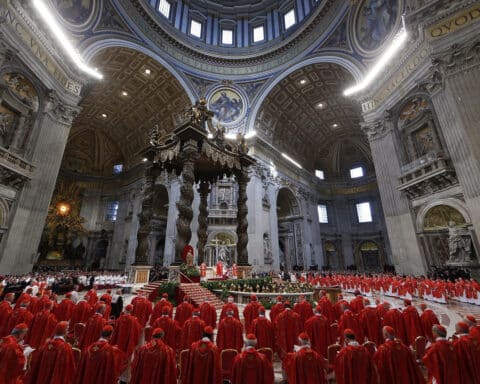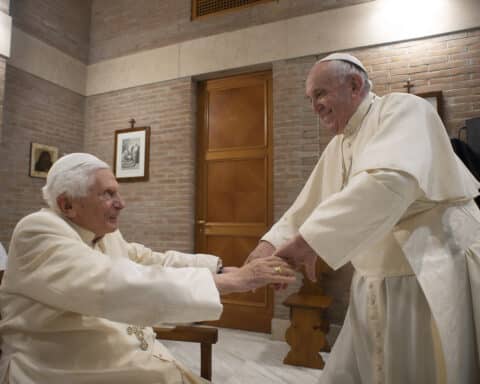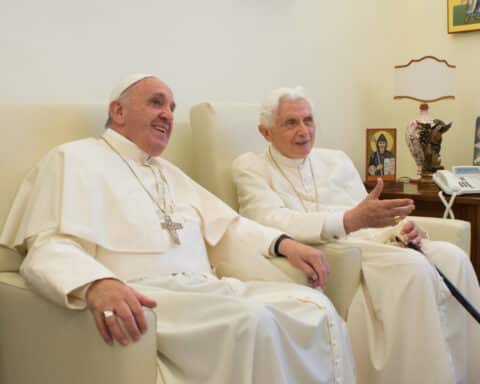“It’s completely dark. I am gripping my mother’s lap. Burying my face so deeply into her stomach I can’t breathe. I come up for air and see two police officers looming over us. I know they want to take my mom away, but I’m scared and don’t want to let her go. I fasten myself to her as hard as I can.”
That’s Rob Henderson’s earliest memory. He recounts it in “Troubled: A Memoir of Foster Care, Family, and Social Class.” On one level, the book is an examination of conscience about adult selfishness. (Most of us can naturally be. Our fallen nature and all. Which is why we need Jesus, Our Savior.) But one of the remarkable things about the book is Henderson isn’t bitter. He doesn’t demonize anyone — and he sure could. He relays the messiness of life while showing how any moments of adults paying attention and opportunities can go a long way.
As he talks about in the book and in interviews, he could be dead, he could be in jail — just looking at his own peer group from high school, it could have been him in either case. He wound up joining the military and going on to an Ivy League education and beyond. Life as a public intellectual, which is how he might best be described now, was the furthest possibility when he was being offered meth by friends and friends of friends. (By some miracle, he had the good sense to stay away from that level of danger. Even some of the kids he was around had experiential concern about going that deep into experimentation.)
The priority of child welfare
Henderson was a voracious reader. And that’s not something to be missed from the testimony of “Troubled.” Despite the unstable, uncertain, at-time-chaotic circumstances of his young life — and the trauma that he had to have internalized from his earliest years — reading got his mind working and active in environments that wouldn’t otherwise have encouraged or exercised that. A teacher now and again noted that, and reached him for noticing, and ultimately contributed to his decision to give up some of his freedoms to join the Air Force, to learn some of the skills and disciplines his childhood was largely devoid of.
It would be wonderful if Henderson spoke in inner-city schools — directly to kids like him. To let them know there is more than house to house to prison to prison.
When you realize that there are children in America today who age out of foster care and purposely get themselves arrested so they have somewhere to be — to eat and shower and sleep — all those scriptural mandates about the orphan should nudge the conscience. Mine and yours.
“Troubled” isn’t a polemic or commentary on the people in his young life. But the mere facts — and Henderson got all the paperwork on his case through the years to fact-check his memory and know more of the backstory before writing the book — should light a fire about the priority of child welfare.
Henderson writes about being abandoned by his adoptive father — after getting into the home that could have been his forever family. To this day, he doesn’t know who his birth father was, though he was led to believe that he was named after him. He writes about how in the devastation of that second abandonment — “being discarded by a second dad” — he “flipped the switch I had built — the one that turned off my sadness.”
The story of a flourishing life
There are little things, too, that matter. “I think I was supposed to be left-handed, as my left hand is stronger and I favor it for every activity except writing,” Henderson writes. “But at the schools in LA, no adults paid attention to which hand I preferred and made me use my right hand because it was easiest for them.”
If you are a parent or teacher or mentor who gets to know and notices the children in front of you — or goes out of your way to make sure there is a child who needs an adult in front of you — know you are doing some of the most important work there is.
There’s been so much anger and confusion since Roe v. Wade was overturned by the Supreme Court and so much of it is made worse by politics. “Troubled” is not political. It’s the story of someone who by God’s grace (my words, not his) lived to tell his story to challenge us to do our duty and prioritize children, especially the most vulnerable who don’t have the love and stability they deserve.
There has been some airing of grievances in the headlines in recent weeks — as campuses have been shut down in political protest that, I’m afraid, is really antisemitism. Rob Henderson’s “Troubled” tells of how a life can flourish when there is plenty to legitimately be angry about, but one miraculously chooses hope anyway.






